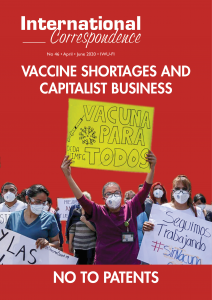Foreword
More than a year has passed since the pandemic was declared and unfortunately, our new edition of International Correspondence once again has as its centre the drama that Covid 19 represents for the peoples of the world. But the underlying drama is what this pandemic has brought to light, which is the debacle of the capitalist-imperialist system.

There is a shortage of vaccines and a tremendous inequality in distribution between rich countries and the poor nations in Africa, Asia, and Latin America. Patents are the great obstacle to mass and emergency production and free distribution of vaccinations. It is the capitalist business of the multinationals.
This is why there is a growing and progressive worldwide movement that demands the cancellation or suspension of patents on vaccines to end the pandemic. Among them are Doctors Without Borders and the call for “A People’s Vaccine” led by diverse personalities such as the 2006 Nobel Peace Prize winner, Muhammad Yunus, from Bangladesh, the artists George Clooney, Annie Lennox, Forest Whitaker, Sharon Stone and singer Yemi Alade, among others. They propose to get 1,500,000 signatures demanding that governments “to lift patents, freely and openly share technological knowledge and not allow speculation during the pandemic.”
The IWU–FI is part of this battle for patents to be cancelled and vaccines for all. On 14 April, we promoted a global day given the fact the World Trade Organisation (WTO) announced that it was holding a meeting to discuss the issue. As expected, “the discussion on the suspension of patents did not lead to any conclusion” (www.gestion.pe/mundo). The WTO is a representative body of the capitalist-imperialist system, which is responsible for the social and health debacle that we are experiencing. The WTO has long endorsed patents and multinational pharmaceutical companies. Only with a great protest and a worldwide mobilisation will it be possible to get patents released.
This new edition of International Correspondence is dedicated to this fight by promoting the need to produce actions and mobilisations of workers and popular sectors in each country.












